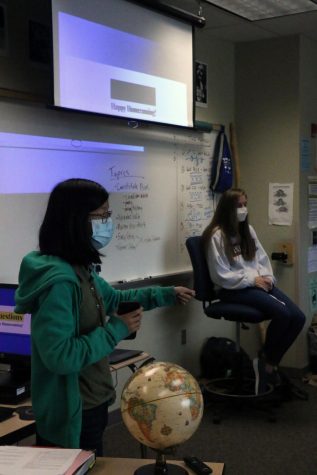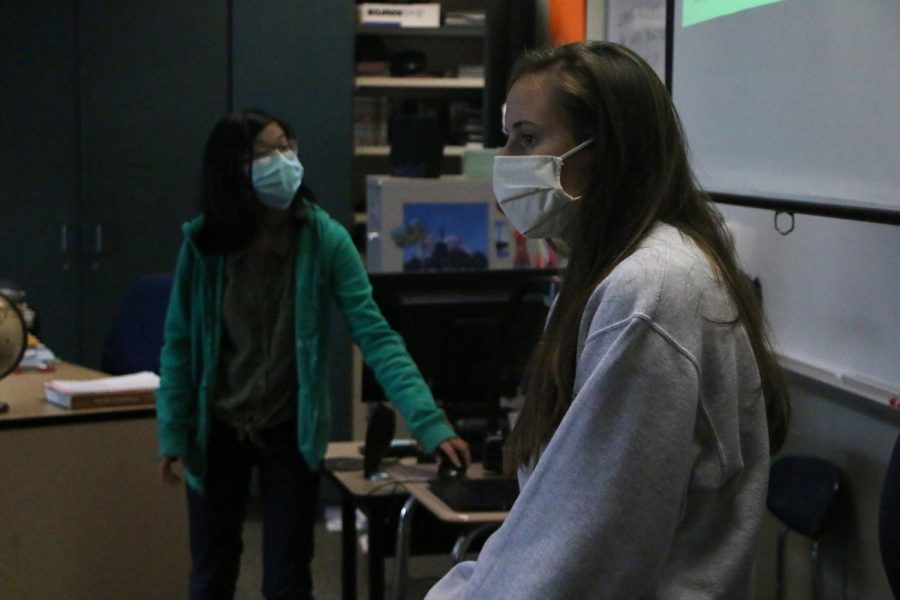Q&A With Jenna Carter, co-founder and president of the civics club and senior.
What initiatives is the civics club taking this year to get people to sign up to vote?
Civics Club overall is trying to focus a lot on people’s civic duty, which is not just around voting. But because of the election this year, we are focusing on voting and being aware of what’s going on with the election. So the initiatives that we’ve taken so far (are we’ve) created posters with the QR code that will take you to the website where you can register to vote in Indiana. And we put them in the cafeterias and many teachers also put them up in their classroom. And then last week, it was high school voter registration week, and we had members of our club or members of Senate— because they were very kind to help us out— go to the senior SRTs and talk to those students about about registering to vote and the importance, as well as presenting the QR code to them again so that they would know where to register to vote.

Do you feel like there has been a lot of engagement?
Honestly, (that’s) kind of hard to measure, because it is just through QR codes. I know, personally, I was able to help four people register to vote. But just having the QR code out there and starting those conversations are really important. Because from there, even if you talk with a sophomore, they’ll go home and talk to their older sisters; you talk to a student who can’t vote yet, they’ll go talk to a friend. And it’s really all about just starting that conversation in this age level, because a lot of people in our age level don’t think about that stuff.
How could someone who is not old enough to vote contribute to the election process?
There are actually a few different things. As I mentioned earlier, just starting the conversation with people who are old enough to vote is important. And then another thing is people who are 16 and 17 years old can actually sign up to be a poll worker, which is very important this year, because normally the poll workers are people who have retired, but because of COVID a lot of them aren’t coming out. You can sign up to be a poll worker that day and help run the polls.
What will the Civics Club look like after the election?
We are just starting to think about that. And civics really is more than just voting and more than just being involved in the government. It’s about anything you can do to make your community better, so we’re going to look for maybe volunteer opportunities, or ways to continue to be involved with promoting knowledge of the election system, or of the government in younger students, because it’s just important to get people involved as soon as possible, that way they’ll be active throughout their life. And it’s not just about the government. It’s also about the community.
Are you affiliated with any particular party or just trying to get people involved?
We’re actually a nonpartisan club, so our goal is not to support any candidate. And if we do put out any information, we’re putting out information just about people who will be in this election in general but we will cover both parties, and do it in a non-biased fashion.
What does a typical club meeting look like? Do you have regular club meetings right now?
We have club meetings, both in-person and we offer over Zoom. We meet with our sponsor, (Walter) Meyer, in one of the classrooms that he teaches in and normally we have a brief PowerPoint, with a few key points. And then beyond that, we’ll kind of talk through the ideas (and) what’s coming up. And we’ll look for a lot of input from the members of our club because between just (co-president and sophomore) Chenyao (Liu) and I, we can only come up with so many ideas. There’s so many people who can add so much, so we really look for the input of other people.































![What happened to theater etiquette? [opinion]](https://hilite.org/wp-content/uploads/2025/04/Entertainment-Perspective-Cover-1200x471.jpg)














































![Review: “The Immortal Soul Salvage Yard:” A criminally underrated poetry collection [MUSE]](https://hilite.org/wp-content/uploads/2025/03/71cju6TvqmL._AC_UF10001000_QL80_.jpg)
![Review: "Dog Man" is Unapologetically Chaotic [MUSE]](https://hilite.org/wp-content/uploads/2025/03/dogman-1200x700.jpg)
![Review: "Ne Zha 2": The WeChat family reunion I didn’t know I needed [MUSE]](https://hilite.org/wp-content/uploads/2025/03/unnamed-4.png)
![Review in Print: Maripaz Villar brings a delightfully unique style to the world of WEBTOON [MUSE]](https://hilite.org/wp-content/uploads/2023/12/maripazcover-1200x960.jpg)
![Review: “The Sword of Kaigen” is a masterpiece [MUSE]](https://hilite.org/wp-content/uploads/2023/11/Screenshot-2023-11-26-201051.png)
![Review: Gateron Oil Kings, great linear switches, okay price [MUSE]](https://hilite.org/wp-content/uploads/2023/11/Screenshot-2023-11-26-200553.png)
![Review: “A Haunting in Venice” is a significant improvement from other Agatha Christie adaptations [MUSE]](https://hilite.org/wp-content/uploads/2023/11/e7ee2938a6d422669771bce6d8088521.jpg)
![Review: A Thanksgiving story from elementary school, still just as interesting [MUSE]](https://hilite.org/wp-content/uploads/2023/11/Screenshot-2023-11-26-195514-987x1200.png)
![Review: "When I Fly Towards You", cute, uplifting youth drama [MUSE]](https://hilite.org/wp-content/uploads/2023/09/When-I-Fly-Towards-You-Chinese-drama.png)
![Postcards from Muse: Hawaii Travel Diary [MUSE]](https://hilite.org/wp-content/uploads/2023/09/My-project-1-1200x1200.jpg)
![Review: "Ladybug & Cat Noir: The Movie," departure from original show [MUSE]](https://hilite.org/wp-content/uploads/2023/09/Ladybug__Cat_Noir_-_The_Movie_poster.jpg)
![Review in Print: "Hidden Love" is the cute, uplifting drama everyone needs [MUSE]](https://hilite.org/wp-content/uploads/2023/09/hiddenlovecover-e1693597208225-1030x1200.png)
![Review in Print: "Heartstopper" is the heartwarming queer romance we all need [MUSE]](https://hilite.org/wp-content/uploads/2023/08/museheartstoppercover-1200x654.png)



